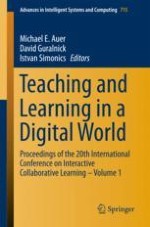2018 | OriginalPaper | Chapter
How to Bring a Graduate Program Closer to Employers’ Needs?
A Case Study in Qatar University in the Field of IT
Authors : Laurent Veillard, Stéphanie Tralongo, Catherine Galli, Abdelaziz Bouras, Michel Le Nir
Published in: Teaching and Learning in a Digital World
Publisher: Springer International Publishing
Activate our intelligent search to find suitable subject content or patents.
Select sections of text to find matching patents with Artificial Intelligence. powered by
Select sections of text to find additional relevant content using AI-assisted search. powered by
